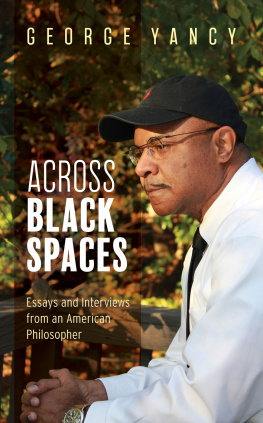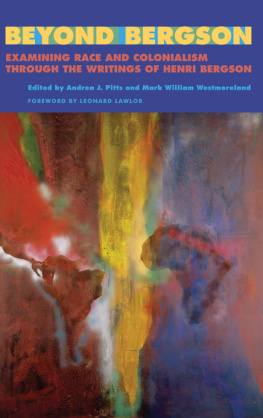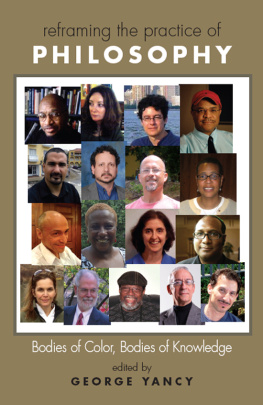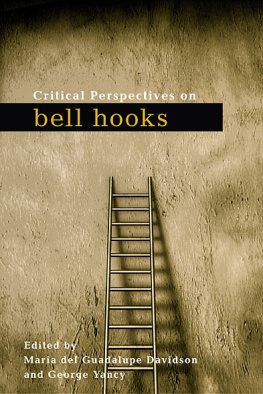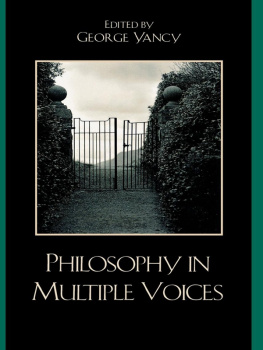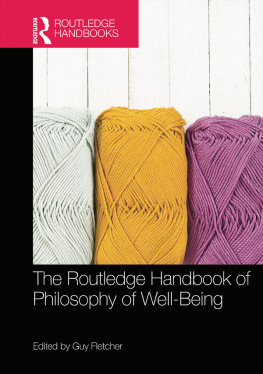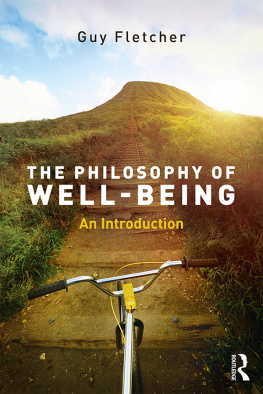Kimberley Ducey - George Yancy: A Critical Introduction
Here you can read online Kimberley Ducey - George Yancy: A Critical Introduction full text of the book (entire story) in english for free. Download pdf and epub, get meaning, cover and reviews about this ebook. year: 2021, publisher: Rowman & Littlefield Publishers, genre: Religion. Description of the work, (preface) as well as reviews are available. Best literature library LitArk.com created for fans of good reading and offers a wide selection of genres:
Romance novel
Science fiction
Adventure
Detective
Science
History
Home and family
Prose
Art
Politics
Computer
Non-fiction
Religion
Business
Children
Humor
Choose a favorite category and find really read worthwhile books. Enjoy immersion in the world of imagination, feel the emotions of the characters or learn something new for yourself, make an fascinating discovery.

- Book:George Yancy: A Critical Introduction
- Author:
- Publisher:Rowman & Littlefield Publishers
- Genre:
- Year:2021
- Rating:5 / 5
- Favourites:Add to favourites
- Your mark:
- 100
- 1
- 2
- 3
- 4
- 5
George Yancy: A Critical Introduction: summary, description and annotation
We offer to read an annotation, description, summary or preface (depends on what the author of the book "George Yancy: A Critical Introduction" wrote himself). If you haven't found the necessary information about the book — write in the comments, we will try to find it.
George Yancy: A Critical Introduction — read online for free the complete book (whole text) full work
Below is the text of the book, divided by pages. System saving the place of the last page read, allows you to conveniently read the book "George Yancy: A Critical Introduction" online for free, without having to search again every time where you left off. Put a bookmark, and you can go to the page where you finished reading at any time.
Font size:
Interval:
Bookmark:
Dr. Kimberley Ducey is associate professor of sociology at the University of Winnipeg in Winnipeg, Manitoba. Her work appears in such publications as Animal Oppression , the Handbook of Public Criminologies , the Cambridge Handbook of Sociology , and the Handbook of the Sociology of Racial and Ethnic Relations . Her books include Revealing Britains Systemic Racism: The Case of Meghan Markle and the Royal Family (2021, with J. Feagin), Racist America (4th ed., 2018, with J. Feagin), Elite White Men Ruling (2017, with J. Feagin), and Liberation Sociology (3rd ed., 2014, with J. Feagin and H. Vera). Previously, Dr. Ducey coedited Systemic Racism Theory: Making Liberty, Justice, and Democracy Real (2017, with R. Thompson-Miller).
Dr. Clevis Headley is associate professor of philosophy at Florida Atlantic University in Boca Raton, Florida. He specializes in Africana philosophy, critical race theory, epistemology, analytic philosophy, philosophy of language, and philosophy of mathematics. He has made considerable contributions to these fields through publications in such journals as Semiotica , Man and World: International Philosophical Journal , Diogenes , Shibboleths: A Journal of Comparative Theory , Philosophia Africana , and the Journal for Social Philosophy , in addition to contributing chapters to numerous books in his areas of specialization. Previously, Dr. Headley coedited two books, Shifting the Geography of Reason (2007) and Haiti and the Americas (2013). In addition to being an active member of many philosophical organizations, Dr. Headley was the cofounder (with Lewis Gordon and Paget Henry) of the Caribbean Philosophical Association. He has presented numerous papers for such conferences as the American Philosophical Association and the International Society for the Study of African Philosophy, and he has given invited lectures at the University of Memphis, the University of the West Indies, the University of Oslo, and Rhodes University in Grahamstown (South Africa). In November 2017, Dr. Headley had the honor of presenting the keynote address at the sixty-third annual conference of the Florida Philosophical Association.
Dr. Joe R. Feagin is distinguished professor and Ella C. McFadden Professor in Sociology at Texas A & M University in College Station, Texas. He has done much internationally recognized research on U.S. racism, sexism, and political economy issues. He has written or cowritten seventy-four scholarly books and 200-plus scholarly articles in his social science areas. His books include Systemic Racism (2006); White Party, White Government (2012); Latinos Facing Racism (2014, with J. Cobas); How Blacks Built America (2015); Elite White Men Ruling (2017, with K. Ducey); Racist America (4th ed., 2019, with K. Ducey); Rethinking Diversity Frameworks in Higher Education (2020, with E. Chun); and The White Racial Frame (3rd ed., 2020). He is the recipient of a 2012 Soka Gakkai International-USA Social Justice Award, the 2013 American Association for Affirmative Actions Arthur Fletcher Lifetime Achievement Award, and three major American Sociological Association awards: W. E. B. Du Bois Career of Distinguished Scholarship Award, the Cox-Johnson-Frazier Award (for research in the African American scholarly tradition), and the Public Understanding of Sociology Award. He was the 19992000 president of the American Sociological Association.

Published by Rowman & Littlefield
An imprint of The Rowman & Littlefield Publishing Group, Inc.
4501 Forbes Boulevard, Suite 200, Lanham, Maryland 20706
www.rowman.com
8690 Paul Street, London EC2A 4NE, United Kingdom
Copyright 2021 by The Rowman & Littlefield Publishing Group, Inc.
All rights reserved . No part of this book may be reproduced in any form or by any electronic or mechanical means, including information storage and retrieval systems, without written permission from the publisher, except by a reviewer who may quote passages in a review.
British Library Cataloguing in Publication Information Available
Library of Congress Cataloging-in-Publication Data
Names: Ducey, Kimberley, editor. | Headley, Clevis, editor. | Feagin, Joe R., editor.
Title: George Yancy : a critical introduction /edited by Kimberley Ducey, Clevis Headley, and Joe R. Feagin ; foreword by Judith Butler.
Description: Lanham : Rowman & Littlefield, 2021. | Includes bibliographical references and index. | Summary: This collection gives George Yancys transformative work in social and political philosophy and the philosophy of race the critical attention it has long deserved. Contributors apply perspectives from disciplines including philosophy, sociology, education, communication, peace and conflict studies, religion, and psychology Provided by publisher.
Identifiers: LCCN 2021030046 (print) | LCCN 2021030047 (ebook) | ISBN 9781538137482 (cloth) | ISBN 9781538137499 (epub)
Subjects: LCSH: Yancy, George. | African American philosophers.
Classification: LCC B948.Y364 G46 2021 (print) | LCC B948.Y364 (ebook) | DDC 191.089/96073dc23
LC record available at https://lccn.loc.gov/2021030046
LC ebook record available at https://lccn.loc.gov/2021030047
 The paper used in this publication meets the minimum requirements of American National Standard for Information SciencesPermanence of Paper for Printed Library Materials, ANSI/NISO Z39.48-1992.
The paper used in this publication meets the minimum requirements of American National Standard for Information SciencesPermanence of Paper for Printed Library Materials, ANSI/NISO Z39.48-1992.
To George and all the students and others whom he has influenced to make the world a better place
In the preparation of this book, we have been indebted to many loved ones and to supportive and helpful colleagues. Although regrettably we cannot name them all, we would particularly like to thank Emma Clements for her amazing editing skills, Brianna Westervelt and Sylvia Landis at Rowman & Littlefield, and Jasti Bhavya who managed the production of our book. We are especially indebted to our insightful Rowman & Littlefield editor, Natalie Mandziuk, for her unceasing and enthusiastic support for this project and its underlying goals. Finally, we offer gratitude to the brilliant contributors, without whose work this tribute to the indefatigable Professor George Yancy would not have been possible.
This volume honors one of the most important and powerful philosophers of our time, singular in his vision and tenacity. George Yancy has sustained a love of philosophy for decades, and this love comes through in his work, whether it is his writing on rap or Black politics; on religious hatreds or spiritual aspiration; on the works of Cornel West, Simone de Beauvoir, Frantz Fanon, Angela Davis, or Frederick Douglass; his reflections on anger and persuasion; his self-reflection on feminism; his numerous interviews and dialogues; or his experiments with the essay form. One might expect that, as someone who has named and described how the white supremacist framework works within the discipline and canon of philosophy, he would break with philosophy as the only way to think outside the terms of white supremacy. But that is not what has happened here. Philosophy is supposed to be the love of wisdom, and that philo is a specific form of love. As an adjective, it is attached to someone close, even precious, a way of calling someone dear or beloved, as we do when we write an intimate letter. As a noun, it is a friend, and as a verb, philein , it is a form of love that entails regarding someone with affection. When Yancy studied philosophy at Yale, he encountered what he called a sea of whiteness, and when he left that program to write as a journalist from the mid-1990s, he sought to understand Black embodiment in the context of a white supremacy that worked its violence in both overt and covert ways. He wrote about hip-hop, but also death, God, and the possibilities of loving and affirmative encounter. He did not exactly leave philosophy, nor did he think that white supremacy owned the future of philosophy. He continued that love of wisdom by seeking to understand what love might mean in the context of a racist culture, what kind of appeal can be made, and through what means could white people be brought closer to the ethical labor of deconstituting white supremacy as it lives, thrives, and reproduces itself in white selfhood and experience. Yancy left that one program in philosophy only to return to Duquesnes Graduate Program in Philosophy with a focus on existential phenomenology. My wager is that it made a difference to have left the academy temporarily, to have passed through journalism that focused on Black popular culture, especially musichip-hop and rapand to have found a keener sense of intimate and respectful love. All this he brought forward into philosophy, expanding its terms, its forms, and its public audience. The journalism never fell away, and the philosophy is, as it were, all over the public writings: the questions; the demonstration of what it is to be unknowing and self-reflective; the effort to discern meaning, even ultimate meaning, in the field of Black cultural production; the openness to other worlds, and the public solicitationthink with me, come closer.
Font size:
Interval:
Bookmark:
Similar books «George Yancy: A Critical Introduction»
Look at similar books to George Yancy: A Critical Introduction. We have selected literature similar in name and meaning in the hope of providing readers with more options to find new, interesting, not yet read works.
Discussion, reviews of the book George Yancy: A Critical Introduction and just readers' own opinions. Leave your comments, write what you think about the work, its meaning or the main characters. Specify what exactly you liked and what you didn't like, and why you think so.



